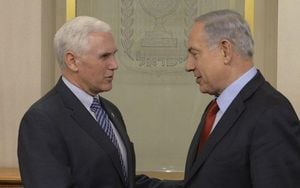OPEC+ Formation of Production Cuts Signals New Era for Global Oil Market
Expectations of stabilized oil prices and heightened tensions among major producers shape the future of global energy enterprise
OPEC+, the coalition of oil-producing nations, has made headlines recently by announcing significant cuts to their oil production. This decision, fueled by declining prices and demand concerns—especially from key importer China—poses intriguing ramifications for the global market. Amidst this backdrop, Brazil's recent accession to the OPEC+ coalition, with its Minister of Mines and Energy Alexandre Silveira confirming the decision, indicates substantial shifts within international energy dynamics.
On February 18, Minister Silveira stated during a national energy policy meeting, "This is a historic moment for Brazil and the energy industry, marking a new chapter for cooperation and negotiations within the energy sector." Brazil's entry signifies not only its commitment to the OPEC Charter on Cooperation but also showcases its enhanced role within the global energy market.
Joining OPEC+, Brazil aims to align its production levels with those of other member nations and adhere to environmental commitments previously established. This intention to balance its role as both producer and environmental steward underlines the complex interplay between sustainable practices and economic interests, especially as Brazil prepares to host the 30th session of the Conference of the Parties (COP30) on climate change this November.
OPEC+, comprising 13 member countries of the Organization of the Petroleum Exporting Countries and 10 countries from outside the group, has historically wielded tremendous influence over global oil prices. By collaborating on production levels, the alliance aims to stabilize shifting demands and hedge against fluctuative economic forecasts. Factors such as economic recovery post-pandemic and geopolitical tensions have added layers of complexity to how both members and non-members navigate their production and pricing strategies.
With Brazil's inclusion, analysts express expectations of greater collaboration between Brazil and existing member nations, potentially reshaping trade relationships and energy diplomacy worldwide. "Brazil's involvement opens avenues for discussions not just about oil production but about cleaner energy initiatives and technologies," noted an industry expert from the International Energy Agency (IEA). This shift is poised to reflect broader trends influencing the global energy transition.
Market observers highlight varying responses to OPEC+'s production cuts, particularly during moments of uncertainty such as conflicts or supply chain bottlenecks. This adjustment aims to counteract dwindling demand, especially from China, which saw unprecedented oil consumption hits during recent recessive economic indicators. Amid these economic cues, OPEC+ hopes these cuts will help stabilize prices, thereby ensuring the viability and sustainability of member countries dependent on oil revenues.
Despite skepticism around the efficacy of such cuts, with some analysts arguing against its potential impact, the unwavering commitment among member nations reflects the seriousness of their resolve. Amid this vast complex of variables, it remains to be seen how new entrants like Brazil will alter the existing power dynamics within the alliance.
Meanwhile, the Brazilian government has also communicated plans to join other influential energy organizations, including the International Energy Agency (IEA) and the International Renewable Energy Agency (IRENA). This multi-frontal strategy is indicative of Brazil’s intent not only to solidify its stature within OPEC+ and the global oil market but also to position itself as a significant player in global renewable energy discussions.
Upcoming legislative sessions will likely focus on Brazilian President Luiz Ignacio Lula da Silva's administration's energy policies, as it navigates the crossroads of pursuing economic growth through traditional energy sources and addressing environmental concerns. Analysts anticipate increased scrutiny concerning Brazil’s actions within OPEC+ and how its original energy commitments will play out as it seeks to fulfill dual objectives.
Looking toward the future, many stakeholders, from governments to financial institutions, are eager to observe the repercussions of this new blend of production governance. Amid conflicting national interests and global supply chain dilemmas, OPEC+ once again finds itself at the helm of influencing energy prices, amid calls for collaboration in addressing climate change.
Global energy markets are likely to remain volatile as these changes materialize, with potential spillover effects across various sectors. The interdependencies of countries involved, their adherence to cuts, and efficiently managing responses to fluctuative demands will be tested, all watched closely by geopolitical analysts and economists alike.
Changing tides within OPEC+ may signal broader shifts not only for market confidence but also how countries strategically align within the sphere of energy. Brazil’s increasing role signifies these adjustments may impact how nations collectively approach the future of both oil and sustainable energy production.



